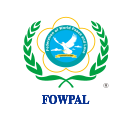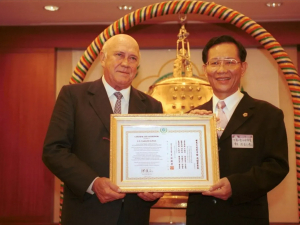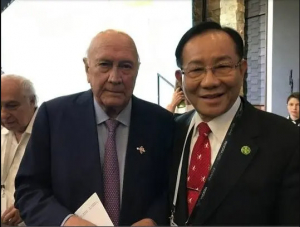Remembering Frederik Willem de Klerk
FOWPAL members in Los Angeles pay tribute to former President of South Africa Frederik Willem de Klerk.
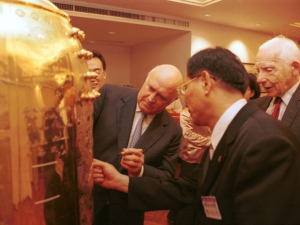 Former President of South Africa Frederik Willem de Klerk passed away on November 11, 2021, at the age of 85, leaving a legacy as a conscientious peacemaker in the world. He was the last white head of state in South Africa (1989-1994), and one of the important figures leading South Africa to democracy, not only enabling South Africa to gain a foothold in the world, but also to flourish peacefully and prosper. In 1990, President de Klerk announced the release of the imprisoned civil rights fighter, Nelson Mandela, and the abolition of the apartheid system in South Africa, which was an important milestone in South African history. In 1993, Mr. de Klerk and Mr. Mandela were awarded the Nobel Peace Prize jointly.
Former President of South Africa Frederik Willem de Klerk passed away on November 11, 2021, at the age of 85, leaving a legacy as a conscientious peacemaker in the world. He was the last white head of state in South Africa (1989-1994), and one of the important figures leading South Africa to democracy, not only enabling South Africa to gain a foothold in the world, but also to flourish peacefully and prosper. In 1990, President de Klerk announced the release of the imprisoned civil rights fighter, Nelson Mandela, and the abolition of the apartheid system in South Africa, which was an important milestone in South African history. In 1993, Mr. de Klerk and Mr. Mandela were awarded the Nobel Peace Prize jointly.
In August 2001, Mr. de Klerk visited Taiwan and rang the Bell of World Peace and Love. He made a wish when ringing the Bell: "My wish is that we will achieve peace through winning the war against poverty, through expanding democracy and through reaching out to each other." With the shared view of world peace, Mr. de Klerk and the president of FOWPAL, Dr. Hong, Tao-Tze, had maintained a good friendship over the years. Dr. Hong's advocacy of a culture of conscience is widely recognized and highly respected internationally. Over the years, Dr. Hong has led members of FOWPAL and Tai Ji Men dizi (disciples) to hold the ceremonies of Ringing the Bell of World Peace and Love across 6 continents. To date, 399 visionary leaders from 122 countries have rung the Bell, including 43 heads of state, 7 Nobel Peace Prize laureates, ambassadors to the United Nations and leaders in various fields. Ringing the Bell of World Peace and Love symbolizes a promise to take actions for peace. The bell ringers made wishes for love and peace for themselves, for the world and for future generations. To fulfil their promises, the bell ringers exert their influence at critical moments and alter the destiny of the world.
In 2002, the United Nations' "World Summit on Sustainable Development" (WSSD) was held in Johannesburg, South Africa. Dr. Hong was invited to the meeting and presented the thesis on the theme "the Future of the World 2002 and Beyond," encouraging all people to start with their hearts regarding sustainable development. In 2019, Mr. de Klerk and Dr. Hong were both invited to the 17th World Summit of Nobel Peace Laureates in Merida, Mexico. Both were invited to the State banquet hosted by Mexican President Lopez Obrador. The two peace leaders, who had not seen each other in many years, were overjoyed to see each other again and share their perspectives on peace. Mutual respect and understanding had enriched their friendship in a meaningful way.
Dr. Hong praised President de Klerk for setting an excellent example for political leaders, and mourned the loss of such a conscientious peacemaker of the world! President de Klerk actively promoted racial harmony during his presidency and abolished the 46-year apartheid policy in 1994. In the same year, he lost to Nelson Mandela in the first multi-racial democratic election in South Africa, bringing the era of white rule in South Africa to a peaceful end. Mr. de Klerk's contribution to defending democracy and human rights and his courage to change at a critical time in South Africa were widely recognized. His legacy will last forever.
The International Day of Conscience is a United Nations-designated day actively promoted by Dr. Hong. Since April 5, 2018, FOWPAL has worked with various permanent missions to the United Nations to promote the culture of peace with love and conscience. Several meetings at the United Nations in New York and Vienna had been held to consolidate views and support. The Kingdom of Bahrain proposed a draft resolution of "Promoting the Culture of Peace with Love and Conscience," which was adopted by the 73rd session of the United Nations General Assembly on July 25, 2019. The UN General Assembly adopted the resolution and declared April 5 as the International Day of Conscience, which is the 166th United Nations Day. In order to promote the idea of "Changing the World with Conscience" around the world, FOWPAL has been organizing numerous online forums on important United Nations days and actively invited heads of state and leaders from all walks of life to take part in.
Mr. de Klerk had visited Taiwan nine times to share his experience in democratization and transitional justice in South Africa. In 2010, the Association of World Citizens, FOWPAL, and Tai Ji Men Qigong Academy jointly organized the "Good Hearts, Good Articles, Protecting the Earth Global Essay Writing Campaign," which brought together more than 11,700 organizations from 196 countries and collected more than 250,000 essays. Two former presidents and Nobel Peace Prize winners, Frederik Willem de Klerk and Nelson Mandela, also presented their essays.
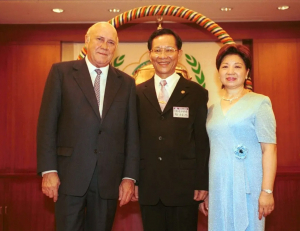 In his paper "20 years later: What Have We Learned?" Mr. de Klerk stated that historians will regard the beginning of February 1990 as the watershed of South Africa's modern history. From his speech to the Parliament on Feb. 2 to Mandela's release on Feb. 11, South Africa has forever changed. "Those crucial nine days set the country irreversibly on the road to a different, and I believe, a much better future." For years, the black South Africans and the international community had been pressing the South African government to break away from the powerful white domination rooted from history and circumstances.
In his paper "20 years later: What Have We Learned?" Mr. de Klerk stated that historians will regard the beginning of February 1990 as the watershed of South Africa's modern history. From his speech to the Parliament on Feb. 2 to Mandela's release on Feb. 11, South Africa has forever changed. "Those crucial nine days set the country irreversibly on the road to a different, and I believe, a much better future." For years, the black South Africans and the international community had been pressing the South African government to break away from the powerful white domination rooted from history and circumstances.
In his February 2, 1990 speech, Mr. de Klerk set out a vision that included "those aims include a new, democratic constitution, universal franchise; no domination; equality before an independent judiciary; the protection of minorities as well as of individual rights; freedom of religion; a sound economy based on proven economic principles and private enterprises …" During his political career, he had been devoted to collaboration and negotiation to gradually build up mutual trust and reconciliation between the opposite sides. He said years later that the only way the country could move forward in the face of troubling historical mistakes was to promote reconciliation in good faith.
Today the Republic of South Africa is often referred to as the "Rainbow Nation," symbolizing the end of apartheid and the newfound cultural diversity of the country. It is hoped that people of various races can live together in this beautiful, peaceful country. South Africa is the 35th largest economy in the world and one of the largest and most developed economies in Africa.
